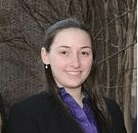 By KERRY WORTHINGTON
By KERRY WORTHINGTON
As 2017 wraps up, it is becoming clear that leaders need support and an audience. As Janine Finnell, Executive Director, Leaders in Energy, pointed out – change leaders like Martin Luther King Jr. and Susan B. Anthony did not achieve their visions alone. They always have a supportive team to light the spark of action. The Leaders in Energy community is a global support team to encourage collective action and sincere change.
What started off as a Linked-In group several years ago is now a multigenerational leadership and global action network. In 2017, LERCPA earned its 501(c)(3) status, conducted or participated in 14 events and workshops and expanded the number of its sponsors and benefactors. Much more is planned for 2018.
This 4th annual 2017 Four Generations of Clean Energy and Sustainable Solutions Awards and Holiday Event recognized leaders in each of the four generations in the workplace, e.g., Millennial, Gen X, Baby Boomer, and World War II/Traditionalist. The event was sponsored by ArlingtonGreen, Longenecker & Associates, and Waterford, Inc. The event benefactors donated door prizes (revealed at the end). This was also Leaders in Energy 50th event!
The attendees were multi-generational, indeed, spanning from the World War II generation to Generation Z – what some are calling the iGeneration. Speakers noted that the room felt like a family and that the enthusiasm was high.
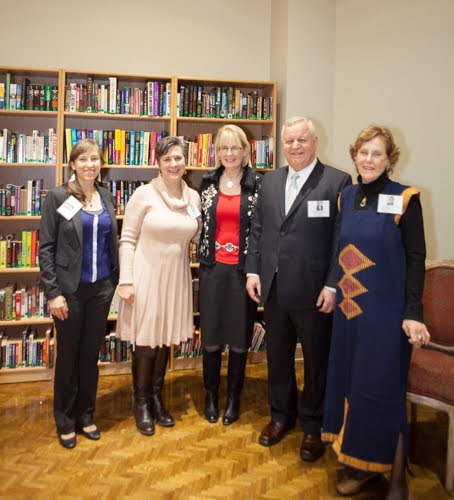
Generational awareness is key to being a professional with perspective. During the networking portion of the event, I surveyed some of the audience members on their thoughts about their generation, what it was like to enter the working world as a new professional when their generation was the youngest, and advice for the upcoming youngest generation. Many of the responders touched on the health of the economy at the time. As a millennial in college during the late 2000s crash, it was eye-opening to be reminded that other generations have lived through something similar and are thriving in their careers. Many boomers’ advice to younger generations centered on building flexible career capital (knowledge, skills, network, etc.) to be able to be resilient no matter the economy and competition.
Some talked politics; that all generations need to vote and to keep a balanced perspective, or be a “pragmatic centrist”. Others mentioned that the Baby Boomers and Millennials are much larger than Generation X, which will have different side effects on demand for certain industries such as healthcare.
Find the consolidated presentation here.
Lifetime Achievement Award – S. David Freeman
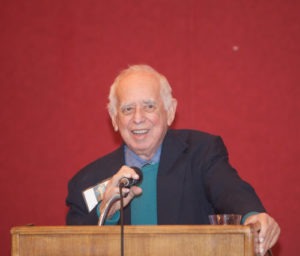
Leaders in Energy, in its first time ever awarding a Lifetime Achievement Award, recognized S. David Freeman, Senior Advisor with Friends of the Earth, for his lifetime commitment to clean energy and good policy practices. He is an engineer, lawyer and author; notably being appointed by President Jimmy Carter to oversee the board of the Tennessee Valley Authority, among other accomplishments such as writing The Green Cowboy: An Energetic Life in 2016.
Freeman started with a quote about the key to living a happy, vibrant life: “we only live in the present, people worry about the future and grumble about the past – and they aren’t living. Live in the present, like every day is your first and your last.” In 1967, he was the first person named to a climate position in the federal government when the popular opinion was to “pray for better weather.” He doesn’t see much a difference today, and “the Lord doesn’t always listen.” Thus, we have work to do, he explained, and “when you have work to do, go to a busy person…” and gestured to Finnell, “and give her another job to do.”
He agrees that there is an urgency of now. Mother Nature absorbs all of the greenhouse gases and, and unlike the federal debt, he jokes, we can’t pay off greenhouse gases. The world needs the good guys, this group’s leadership, or else “we are going to cook, since we are all roommates on this planet.”
If there is one reason for government, he says, it’s this: “to do the things we need to get done collectively that we can’t do ourselves – the army, navy, highways” and to switch to clean energy. Leadership can take us far, but he believes in government mandates. He noted that the Chinese have a mandate for electric cars. He sees switching to clean energy as a way to protect from a safety hazard the way that wearing a seatbelt is to protect us on the road. He believes phasing out and eventually outlawing oil and gas over time is the best way to save the planet.
Finnell presented Lifetime Achievement award to Freeman and then he took questions from the audience. One audience member asked for his opinion on the best city, state, or federal policy (renewable portfolio standard or a price on carbon, for example) for reducing emissions. Freeman replied that what is needed are sweeping mandates for zero emissions by a particular year; but we have yet to decide that we truly have to do it.
Albert Nunez, the Baby Boomer award winner from 2016, lauded Freeman as one of his heroes and asked him why nuclear power isn’t part of his portfolio of implementable ideas. Freeman responded that it’s not in the competitive marketplace right now.
Millennial Generation Award: Camila Thorndike
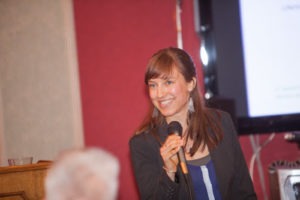
John Craig, Leaders in Energy Advisor, introduced Camila Thorndike, who spearheads the Chesapeake Climate Action Network’s Carbon Pricing Campaign as Director. Thorndike is from southern Oregon, where her Chilean mother owns and operates an organic farm. When she first learned of the greenhouse gas affect, the charts read that the pollution point would really take off around her late teen years. She came to realize that it will be up to her generation to implement climate solutions, but that she couldn’t do it alone.
Currently there are seventeen states working on carbon taxes, although no state currently has a carbon tax (Carbon Tax Center). Thorndike pointed out that in the three times since 1965 that consumption of fossil fuels decreased, it occurred after a price shock due to the 1973 oil crisis, 1979 energy crisis, and the more recent great recession. Thus, she concludes that increasing the cost of oil by putting a price on pollution will incentivize people to conserve and find alternatives, level the (subsidy) playing field for clean energy, and generate revenue to give back to taxpayers or put toward conservation.
Over time, Thorndike has educated peers, helped pass resolutions, and impacted communities. There are fifty nonprofits advocating for a carbon tax in the DC and neighboring states in 2018. They continue to look for support and endorsements, invite anyone who is interested to join in the Polar Bear Pledge in January or otherwise join their cause.
Generation X Award: Lori Arguelles
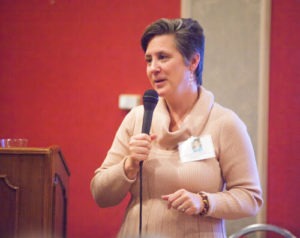
Mark Frieden, with the International Society for Sustainability Professionals, introduced Lori Arguelles. Arguelles is the President and CEO of the Alice Ferguson Foundation (AFF) in Maryland, a local model and retreat for sustainable living. The Cafritz Environmental Center is on the property of AFF and, as of June 2017, is one of the 15 certifications in the world for the Living Building Challenge, an ambitious standard for buildings to be net zero energy, as well as water and carbon neutral.
After several years of planning, designing, and funding the building, the space is now open for meetings and student educational events. Just off the Potomac, the building has hosted many children for an outdoor experience, and many of them have their first true nature experience there learning about their carbon-based environment, vermiculture, pollinators, and much more.
At the living building, they are trying to bridge the natural and built world. Many people have become “convenience addicts,” and convenience has costs we don’t have to pay in the moment, but will ultimately catch up to us in the end. Arguelles wondered how we would act differently if it wasn’t convenient for the municipality to take our trash away or deliver us water. She says that we must invest in education now, over the next 10-12 years, so that elementary students will help design the next generation of carbon neutral buildings by the time they become adults.
Arguelles’s message was that we are all connected. You never know who you are to someone else, whether that’s through mentoring or being an inspiration. Arguelles sees the world similarly to Ban Ki-Moon, former Secretary-General of the United Nations – who recognizes that “saving our planet, lifting people out of poverty, advancing economic growth … these are one and the same fight. We must connect the dots between climate change, water scarcity, energy shortages, global health, food security, and women’s empowerment. Solutions to one problem must be solutions to all.”
Looking ahead to the holidays, also known as one of the trashiest times of the year, Arguelles wants us to wonder if there is a different way, and that there might be a small change we can make to have a magnifying impact. Read her opinion piece in the Washington Post to learn more.
Arguelles ended with a Margaret Mead quote, “never doubt that a small group of thoughtful, committed citizens can change the world. Indeed, it is the only thing that ever .”
Baby Boomer Generation Award: Dr. Kam Ghaffarian, Ph.D.

Keller Staley, Vice President of Longenecker & Associates, introduced Kam Ghaffarian as the Founder and Chief Executive Officer of X-Energy. Ghaffarian always dreamed of being in space and supported the NASA space program and has continued to do so since 1980. He built a company to become the largest 24/7 astronaut services provider to NASA.
Through his philanthropic work in Kinshasa, Democratic Republic of Congo, Ghaffarian came to realize how synergistic energy was to a developing nation. Kinshasa is one of the poorest capitals in the world, and the school he sponsors is in the poorest neighborhood. He noticed that when the area lacked electricity, it lacked clean water. Without clean water, the city lacked health; without electricity, there was no education. A supply of energy correlates with prosperity and health. That resonated with the Ban Ki Moon argument above.
After some research, Ghaffarian decided that he wanted to do something that is clean, safe, secure and affordable. Thus, he developed an alternative nuclear solution: a pebble bed reactor. The technology uses tennis ball-sized spheres of uranium, which go inside a reactor that is 100% meltdown proof and cannot be used for ill purposes. This high-tech design will be on the ground by 2025. The project will require more investment to get there, but he said that X-Energy is committed.
World War II Generation Award: Louise Meyer
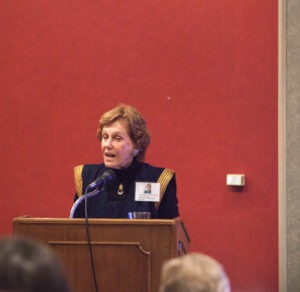
Ronke Luke, a Leaders in Energy member, introduced Louise Meyer, the Co-founder of Solar Household Energy. She said that she admires Meyer’s commitment to Africa and going to the front line of where people need help. Meyer got her start in aiding Africa while running a textile program through the peace corp.
Eventually, she discovered solar cooking. For rural women and men, solar cooking immediately improves their quality of life. Typically, looking for firewood is the main activity for women in Africa and South America. Meyer took an immediate interest in learning to solar cook and founded a 501-c-3, Solar Household Energy.
After some trials in Africa and Mexico, they developed many models of the solar cookers. The cooker donated at the Four Generations event was similar to the one they used in a project for their most recent project in Haiti. The model on display for a door prize was for 5-7 people, while the needs in Haiti call for a cooker for 15 people.
To learn about solar cooking herself, she cooked in her DC home from April until October on a cooker designed for the tropics. In DC, the temperature reaches 200-250 degrees Fahrenheit, while in a developing country it can reach upwards of 300 degrees Fahrenheit. These cookers give independence to people. “The world is not essential here,” as Meyer says, meaning that infrastructure constraints shouldn’t limit one’s ability to cook.
And this can apply in developed countries too. Whether it be a snow storm or power outage, a solar cooker can guarantee that there is a way to cook food. Meyer gave an example of Jose Andres, a stellar, philanthropic chef with restaurants in DC, cooking for his neighbors in the Bethesda area during a three-day power outage with a solar cooker.
In that sense, a solar cooker is smart preparedness planning. The cooker requires no plug, and training for using the cooker may be available to those who are unfamiliar. U.S. citizens might have alternatives, but half of the world’s population, where wars are fought over natural resources, wood, and water, does not have these choices. They took the cooker to a Darfur refugee camp in Chad to see if the refugees would accept it, and they adopted it at an enormous rate. Meyer says “the sun is a natural resource that belongs to all of us.”
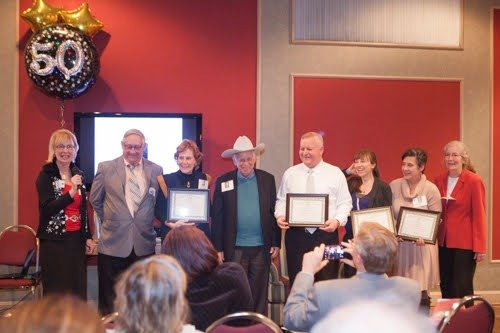
Audience Interaction
Although the awardees are in diverse topic areas – solar cookers, garbage-eating worms to create compost, nuclear power, and a carbon tax – they are all moving the needle on decreasing our energy-environment impact.
The first question was about getting the message through to individuals and communities that may interpret an energy mix change as threatening to their lifestyles, diminishing their opportunities and livelihood. Arguelles responded that communicating that “green does equal green,” meaning that cleaner energy means economic opportunity. In some cases, it might mean being the first Guinea pig as she has done with the Alice Ferguson Foundation. However, this helped to put together the supply chain logistics for someone else to move with. Ghaffarian agreed that pushing the message of new jobs is the way to go with this debate.
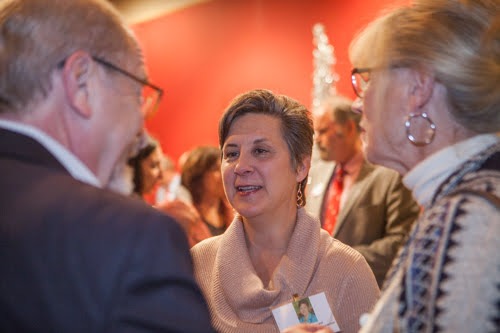 Meyer was asked what the first thing she cooked was and how did it go. When she was teaching herself how to cook, she tried rice first to see if it would work. Now she does a lot of baking and will cook just about anything; adding that it “tastes like the sun.” The first time she cooked for her sister, her sister was anxious because she had been there for a little while without seeing anything being cooked, until the sister asked to go out to eat. Meyer replied that dinner was on the way, and brought in a complete meal. Her sister was surprised to learn that a whole meal could be cooked this way in the middle of DC.
Meyer was asked what the first thing she cooked was and how did it go. When she was teaching herself how to cook, she tried rice first to see if it would work. Now she does a lot of baking and will cook just about anything; adding that it “tastes like the sun.” The first time she cooked for her sister, her sister was anxious because she had been there for a little while without seeing anything being cooked, until the sister asked to go out to eat. Meyer replied that dinner was on the way, and brought in a complete meal. Her sister was surprised to learn that a whole meal could be cooked this way in the middle of DC.
That inspired Arguelles to mention convenience as part of our daily lives. She noted that we as a society are “convenience addicts” and desire instant gratification. We benefit from this, but she thinks it is time to rethink this. It hasn’t always been this way, and now is the time to make the future what we want.
Arguelles added that sustainable solutions can be complex. For example, the Cafritz Environmental Center does not have batteries. The reason is that batteries don’t meet the living building criteria for materials. That’s why sometimes there need to be solutions on multiple levels. Simple solutions are best, but may not be adequate for the problems of today.
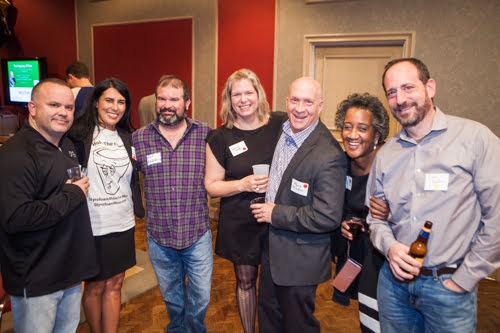 Finnell asked “how can different generations learn and work from one another?” Arguelles responded first: “don’t presume to know who the teacher of the day is.” She continued that experiential learning, using all the senses and engaging the whole self in a learning activity might be better than learning from a textbook.
Finnell asked “how can different generations learn and work from one another?” Arguelles responded first: “don’t presume to know who the teacher of the day is.” She continued that experiential learning, using all the senses and engaging the whole self in a learning activity might be better than learning from a textbook.
Another said that we are all going to have to work together on sustainability, and that one generation is not going to lead the way. Ghaffarian quoted Mahatma Gandhi, “be the change you want to be in the world,” which is a statement that has no disclaimer of age or anything else.
The last question went to Meyer, about the solar cooker: “what was the hardest thing to cook on the solar cooker?” She responded, “making flan,” as it needed to be at the right temperature. YouTube has videos to show how different solar cookers work.
Kerry Worthington is a Senior Manager at National Association of Regulatory Utility Commissioners. She began volunteering for Leaders in Energy in spring 2015. She is a young professional working in the state regulatory space, specifically on multi-state issues. Transmission system planning and analysis from a policy point of view has been her focus area for several years, and she is growing into the distributed generation area with an eye on environmental topics.
Leaders in Energy is building a community of engaged leaders to create a sustainable energy system, economy, and world. The three main areas of action are the green economy, sustainable communities, and multigenerational leadership. With operations in Metro Washington DC, we’ve built a base that spans most major metropolitan areas and over 100 countries. More information is available at https://www.leadersinenergy.org and in the Leaders in Energy Research, Communication, Policies & Analysis (LERCPA) LinkedIn group.
Photographs courtesy of Agustín N. Cruz, ArlingtonGreen, augie.cruz@gmail.com


Leave a Reply